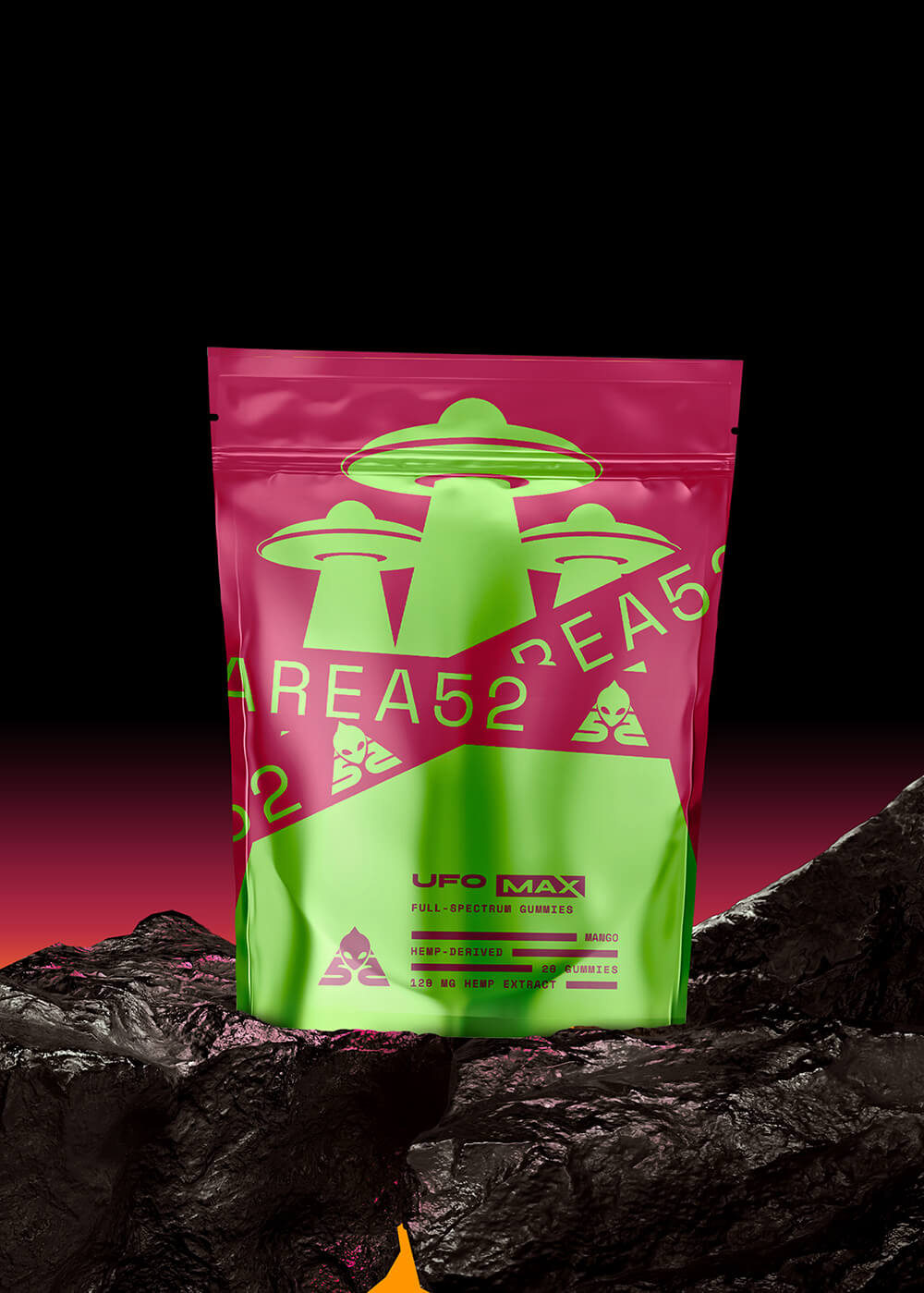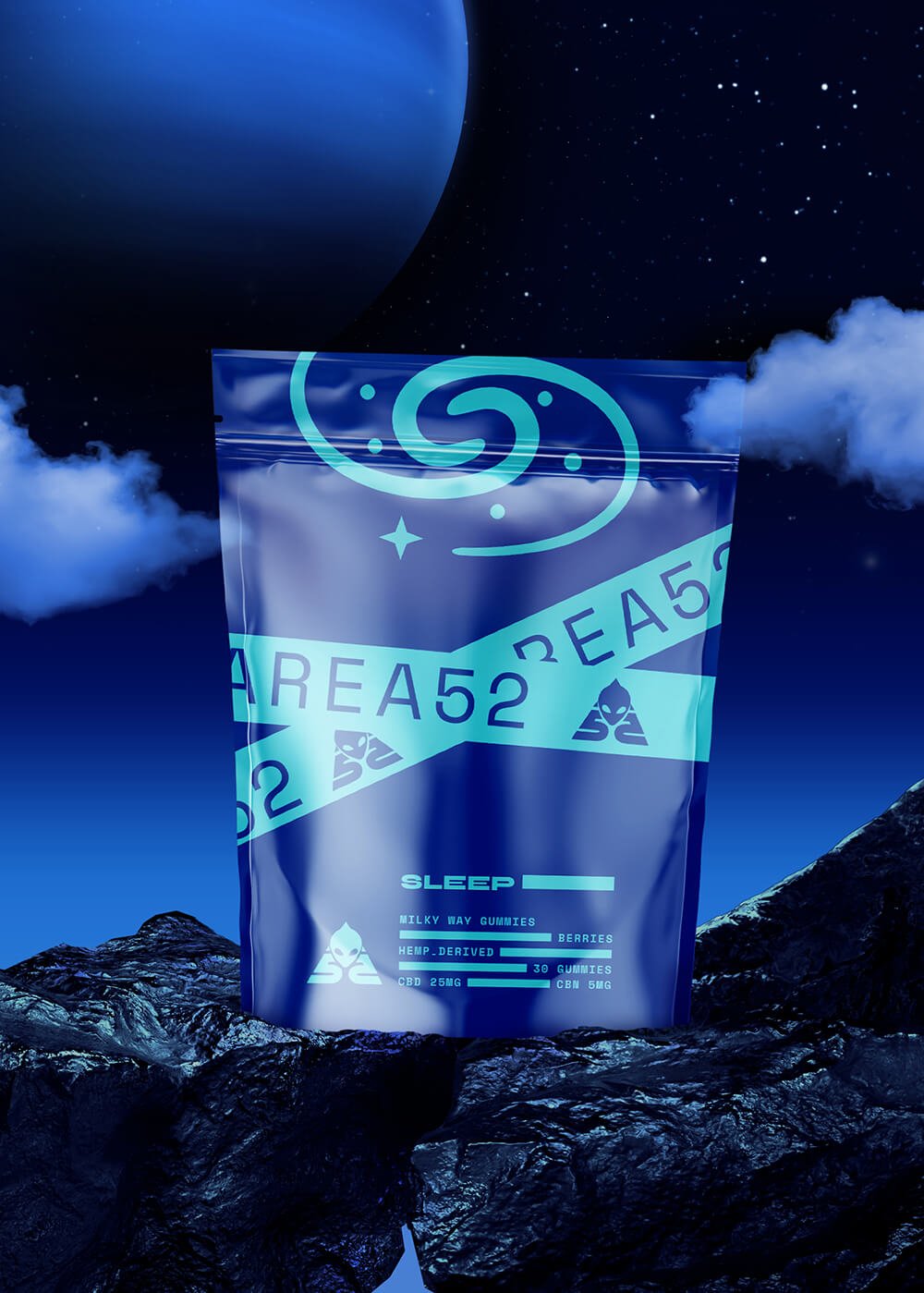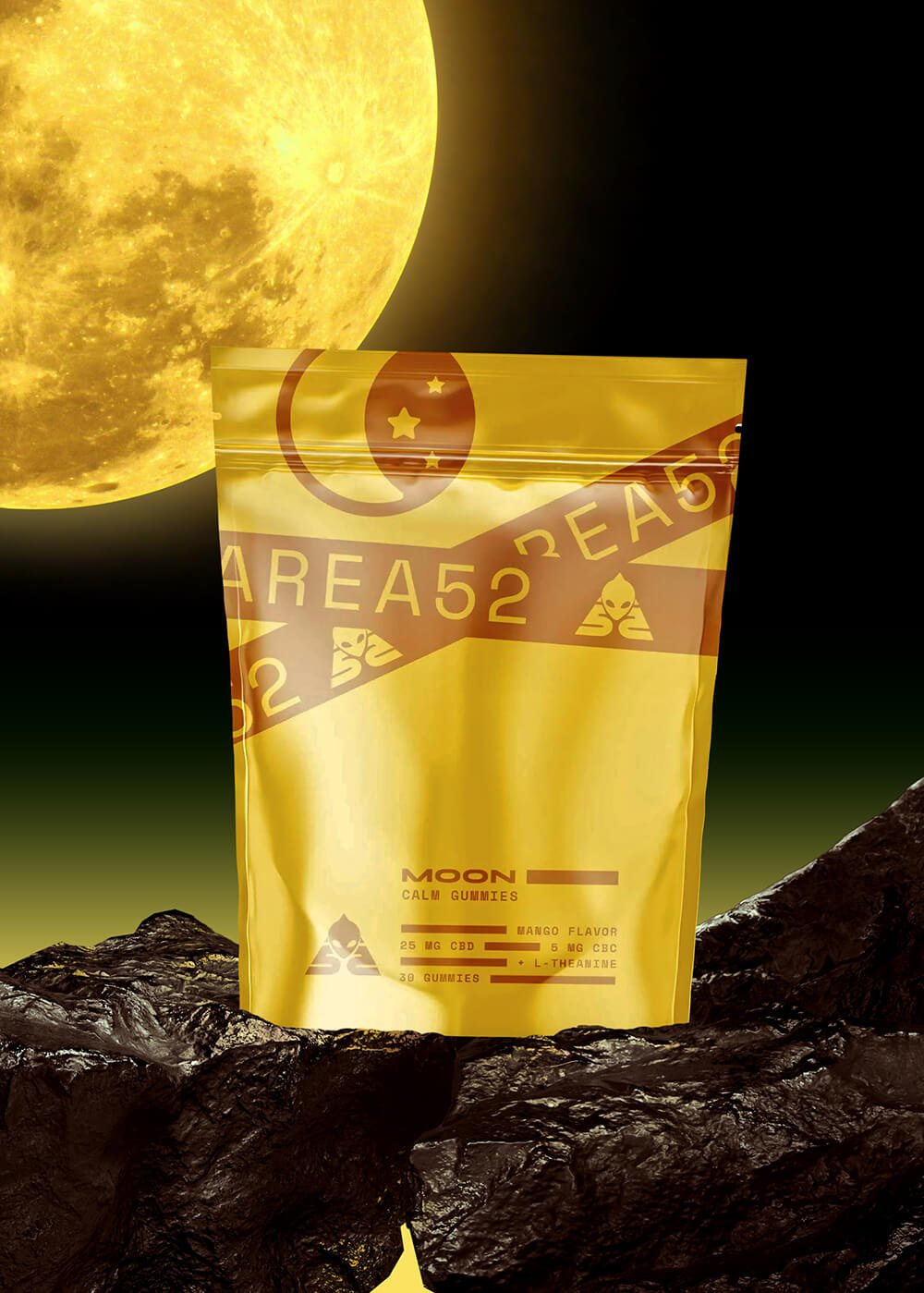CBG vs. CBD: Differences, Benefits, & Effects
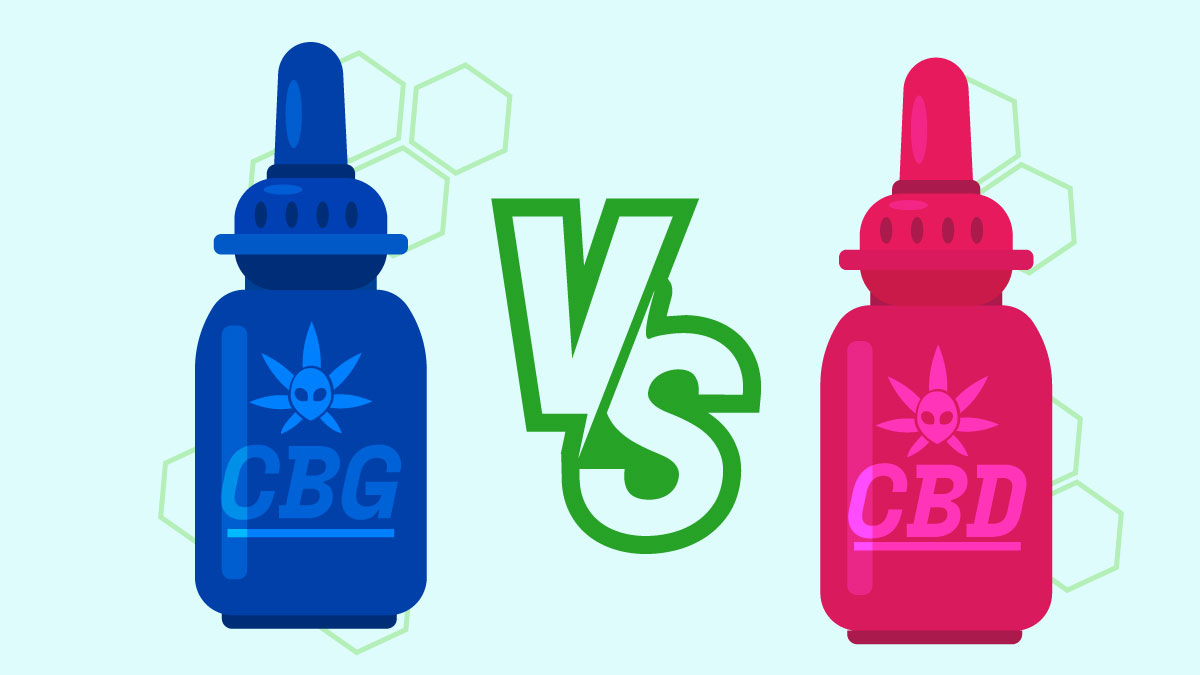
Cannabigerol (CBG) and cannabidiol (CBD) are just two of more than 100 cannabinoids found in cannabis plants.
Many people lump CBG and CBD together because they are both non-psychoactive, but some key differences between them are important to understand before choosing which is suitable for you.
This article compares CBG and CBD based on their effects, price, and accessibility.
What’s the Difference Between CBG & CBD?
CBD (stands for cannabidiol) is one of the most well-known and popular cannabinoids, owing to its widespread legality, calming action, and reasonable price. Unlike THC, CBD produces a high, making it feasible to take throughout the day without suffering any reduced awareness or altered headspace.
On the other hand, CBG is a relative newcomer to the mainstream cannabinoid scene. Even experienced CBD and THC users may not have heard of CBG, and far fewer have tried it themselves. CBG’s scarcity is mainly due to its low bioavailability in cannabis, making extracting and processing it expensive.
Let’s take a closer look at the main similarities and differences between CBG and CBD.
Comparison Chart of CBG vs. CBD
| CBG | CBD | |
| Effects | Motivating, non-psychoactive | Calming, non-psychoactive |
| Legality | Legal federally and in all states, provided it’s derived from hemp plants | Legal federally and in all states, provided it’s derived from hemp plants |
| Cost | Quite expensive | Affordable |
| Market Availability | Hard to find | Very accessible |
| Dose | 5-10 mg for beginners
10-25 mg for experienced users |
5-10 mg for beginners
10-25 mg for experienced users |
| Percentage In Hemp | Less than 2% in fully grown plants but around 30% in young plants | Between 2% and 10% in most strains. 15% is possible |
| Percentage in Marijuana | Less than 2% in fully grown plants but around 30% in young plants | Between 0% and 15% |
| Optimal Growth Stage | Highest in cannabis harvested early | Highest in freshly harvested hemp and marijuana |
CBG vs. CBD: Effect Profile
CBG and CBD occupy different niches in the cannabis world despite sharing some effects. Let’s start with CBD.
What Are The Effects of CBD?
One of the most common effects reported by CBD users is a sense of relaxation.
Importantly, these calming effects aren’t a result of intoxication. CBD doesn’t interact strongly with the endocannabinoid system’s CB1 receptors, so it doesn’t produce a high.
Research into the clinical uses of CBD is still in its infancy. More time and research are needed to corroborate CBD’s effectiveness in a medical setting.
What Are The Effects of CBG?
CBG is similar to CBD in a few ways. Like CBD, it’s non-psychoactive, so it can be taken in the same settings as CBD and doesn’t come with any of the downsides of an intoxicating cannabinoid, like delta 8 or delta 9 THC.
Despite these similarities, CBG is more than merely a clone of CBD. For starters, many CBG users report feeling a noticeable boost when taking it. They also claim to have fewer distractions when taking CBG.
The bottom line is that busy users should probably choose CBG, while CBD better serves people who want to wind down.
CBG vs. CBD: Legality
Both CBG and CBD are legal in the United States, thanks to the 2018 Farm Bill. As long as any CBG or CBD products are hemp-derived, they’re federally legal. The United States government defines hemp as any cannabis that contains less than 0.3% THC.
Individual states can choose to regulate CBD or CBG as they see fit, although they remain legal in most states to date.
CBG vs. CBD: Cost
CBD is a more established and mature cannabinoid and is therefore significantly cheaper than CBG.
Despite their similarities, CBD has the advantage of being the first non-psychoactive cannabinoid to receive mainstream attention, thanks to its relatively high concentration in cannabis.
This first-mover advantage means that manufacturing CBD products is more advanced and much cheaper than producing CBG products.
CBG may become as affordable as CBD in the future if demand becomes high enough, although this is somewhat unlikely.
CBG’s comparatively low concentrations make it more difficult to extract and process than CBD.
CBG vs. CBD: Market Availability
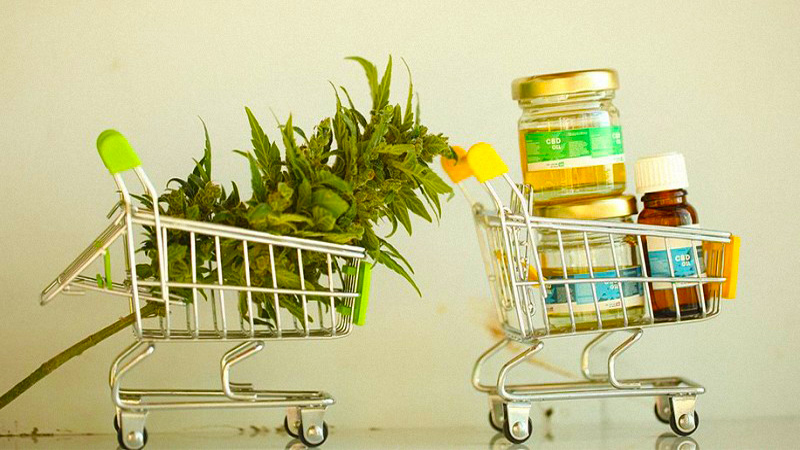
Based on the previous section, you’re probably not surprised to hear that CBG is much harder to obtain than CBD. Economically speaking, CBD’s astronomical demand compared to CBG makes it the easy choice for companies looking to be profitable in the cannabinoid market.
The few companies that make CBG products only make small batches, and therefore stock runs out quickly despite the low overall demand.
CBG vs. CBD: Dosage
Most people who have taken both CBG and CBD say that the dose size for each is similar. Beginners should start slowly, whether they’re taking CBG or CBD; 5-10 mg is usually a good starting point for most people.
The right dose for an individual varies depending on their weight and metabolism. Most experts recommend taking 5 mg to start and increasing in 5 mg increments until you find what works for you. More experienced users typically find they have the best experiences taking between 10–30 mg.
A common misconception is that CBD can be psychoactive in very high doses. This statement has no truth, and research shows that even massive volumes don’t produce THC-like effects.
However, some CBD and CBG users have reported headaches, nausea, dizziness, and other adverse symptoms with large doses. To avoid any potential adverse effects of CBD or CBG, keep your dose below 40 mg.
CBG vs. CBD: Chemical Structure
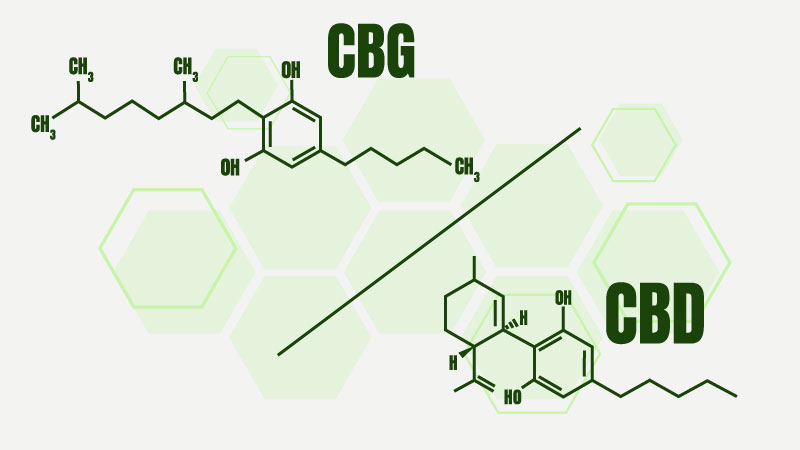
Chemically, CBD and CBG are more similar than different. Both CBD and CBG are organic molecules consisting of long carbon chains, hydrogen, and oxygen. They also both begin their molecular lives as cannabigerolic acid (CBGA).
The chemical differences between CBG and CBD come from the differences between their formation processes. CBG forms through decarboxylation of CBGA. CBD is formed when CBGA is converted to cannabidiolic acid (CBDA) first. CBD then forms through decarboxylation of CBDA as the cannabis plant ages.
CBG vs. CBD: Drug Tests
Both CBD and CBG may cause you to fail a drug test, especially if the product is full-spectrum — though the chances are low. Small doses of either CBG or CBD are especially unlikely to show up on a drug test.
CBG vs. CBD: Do They Get You High?
CBG and CBD are not psychoactive cannabinoids.
Most experts recommend keeping your dosage below 40 mg, but this is to avoid adverse effects like headaches and nausea. No dose of either cannabinoid is known to produce a psychoactive effect.
The feelings of euphoria, giggliness, and sluggishness often associated with psychoactive cannabinoids like THC or delta 8 THC are not present when taking CBG.
CBG vs. CBD: Which Is Better?
Despite some overlap in their generic effects, CBG and CBD provide different experiences to their users. Neither is inherently better than the other, and which is right for you depends on what you’re looking for.
There are many cannabinoids found in cannabis plants but people looking for a non-psychoactive cannabinoid with a more uplifting profile turn to CBG. On the other hand, CBD is usually the more popular option for someone wanting non-psychoactive effects and a more laid-back profile.
Beyond effects, practical considerations like cost and availability make CBD the better option for most people who want a non-psychoactive cannabinoid. CBG is much more expensive and significantly harder to find than CBD, making it a less attractive option overall. However, its unique effects among mainstream cannabinoids give it a bright future if the infrastructure supporting its production improves.
References Used
- Martínez, V., Iriondo De-Hond, A., Borrelli, F., Capasso, R., Del Castillo, M. D., & Abalo, R. (2020). Cannabidiol and Other Non-Psychoactive Cannabinoids for Prevention and Treatment of Gastrointestinal Disorders: Useful Nutraceuticals?. International journal of molecular sciences, 21(9), 3067.
- National Academies of Sciences, Engineering, and Medicine. (2017). Therapeutic effects of cannabis and cannabinoids. In The health effects of cannabis and cannabinoids: The current state of evidence and recommendations for research. National Academies Press (US).
- Grotenhermen, F., Russo, E., & Zuardi, A. W. (2017). Even high doses of oral cannabidiol do not cause THC-like effects in humans: Comment on Merrick et al. Cannabis and Cannabinoid Research 2016; 1 (1): 102–112; DOI: 10.1089/can. 2015.0004. Cannabis and Cannabinoid Research, 2(1), 1-4.
- Formato, M., Crescente, G., Scognamiglio, M., Fiorentino, A., Pecoraro, M. T., Piccolella, S., … & Pacifico, S. (2020). (‒)-Cannabidiolic acid, a still overlooked bioactive compound: an introductory review and preliminary research. Molecules, 25(11), 2638.
